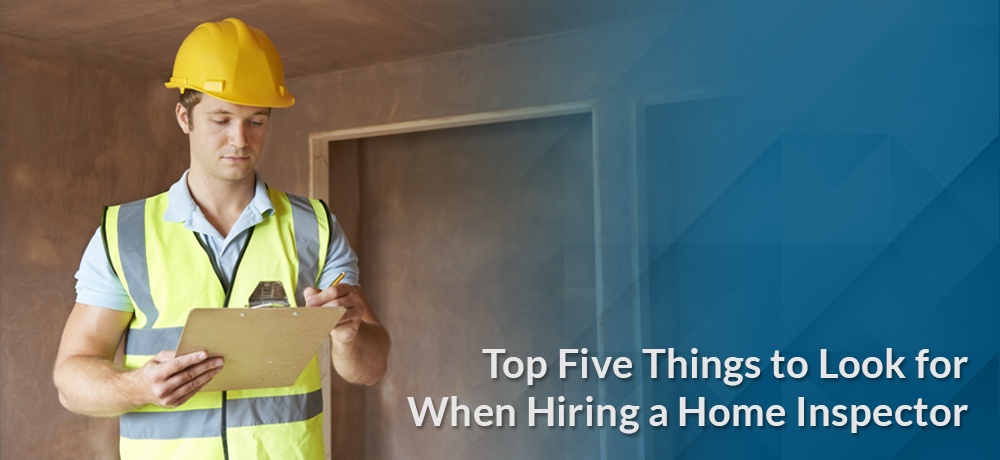Top Five Things to Look for When Hiring a Home Inspector

It’s no secret that buying a home is a huge financial and emotional commitment. Most of us purchase a home just a few times in our lifetime, and it’s crucial to make a well-informed decision since there’s a lot of money at stake. Home buying involves many steps and getting your future home inspected is an indispensable step in the run-up to the purchase. A home inspection is your opportunity to get a knowledgeable assessment of the home you are going to buy, which is why hiring the right home inspector is a must.
A home inspector combs a property to identify any health and safety problems, positive or negative conditions of the property and any conditions that need further specialized attention. He also checks structural elements such as the roof, foundation, walls, windows, doors, insulation, basement or crawlspace, and attic. Electrical, plumbing, heating and cooling systems are also part of a home inspection.
To help you get your home assessed by the right home inspector here’s a list of top five things to look for when hiring a home inspector.
1. Choose a Certified Home Inspector
The home inspection profession is an unregulated industry, except in British Columbia and Alberta, making your choice of a home inspector more difficult.
Choosing a CanNACHI inspector means choosing someone you can trust to objectively, independently and apart from anyone's interests, other than your own, provide you with a comprehensive analysis of the home and property's major systems and components.
CanNACHI members know their business. They are trained to objectively demonstrate technical proficiency and report-writing skills and have committed to continuing education to achieve and maintain their member status.
Members are committed to conducting inspections by CanNACHI 's Standard of Practice; committed to abiding by the CanNACHI Code of Ethics and are dedicated to providing superior customer service.
2. Liability Insurance & Other coverage
I am continuously surprised at the number of inspectors who do not carry professional liability insurance or, as it is popularly known, Errors and Omissions Insurance (“E & O”). The truth is that certified home inspectors need E&O; insurance as much as any other professional.
It's critical to make sure that your home inspector has insurance, especially Professional Liability Insurance. If an inspector doesn't have this insurance, it could mean that he or she hasn't been in business very long or has a poor track record.
E&O insurance is much like malpractice insurance. This gives consumers some recourse should a mistake occur. Also, inspectors should also carry general liability insurance. What if the inspector's flashlight falls off the table and breaks a precious figurine or a ladder falls onto a car due to high winds. General liability insurance would help protect the inspector, homeowner, buyer, and realtor from unfortunate accidents.
3. Ongoing Training
No matter how much experience an inspector has, he or she should still receive continuing education. Like any other skilled professionals, home inspectors need to keep up with current news, trends, and developments in their industry. An inspection company that doesn't require employees to receive ongoing training may not be conscientious about keeping current with systems and components found in modern homes.
4. Detailed Inspections Reports
Generally speaking, reports should describe the major home systems, their crucial components, and their operability, especially the ones in which failure can result in dangerous or expensive-to-correct conditions. Defects should be adequately described, and the report should include recommendations.
Reports should also disclaim portions of the home not inspected. Since home inspections are visual inspections, the parts of the house hidden behind floor, wall and ceiling coverings should be disclaimed.
Inspection Reports should be written as a narrative report, using reporting language that more thoroughly describes each condition. Descriptions are not abbreviated, and the report is not a checklist. The report should contain detailed photographs documenting the home, and any defects or deficiencies that it may have.
Home inspectors are not experts in every system of the home but are trained to recognize conditions that require a specialist inspection.
5. Client Satisfaction
One must be a "people person" and a good communicator to enter the home inspection business. Home inspectors work with a diverse clientele. Most of the clients are home buyers, and as homes vary in price and qualities, so do the people buying them. Providing exceptional customer service is central to finding a good home inspector.
The key to a successful home inspection is the reassurance from the client that the home inspector has clearly communicated reasonable expectations of conducting the home inspection.
Equally important is the necessity for the home inspector to comply with the Standards of Practice. The Standards of Practice provides clear guidelines to follow, thus protecting the home inspector, consumer, and the profession. Without this “standard” the whole scope of the inspection will be open to a possible misunderstanding of the terms of reference for the inspection work.
If you’re looking for a home inspector in Niagara, St. Catharines, Welland, Fort Erie, Port Colborne, Fonthill, Grimsby and Stoney Creek, contact Elementary Property Inspections. We are more than just a look into our client's potential home. We also ensure that you know your home. Our home inspections are intended to educate by giving you a needed understanding of the property and an overview of how the systems in the homework, and how they should be maintained throughout the change of seasons and over the years. To know more about us, click here.